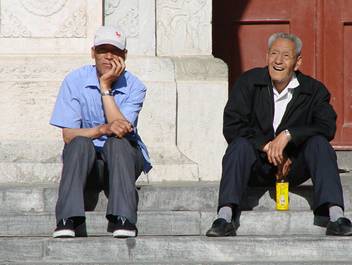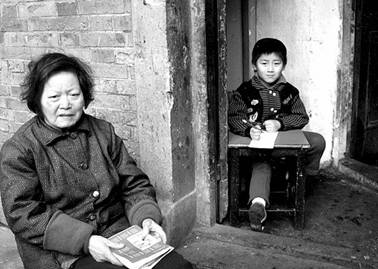I live in China, which means I eat jiaozi with chopsticks, ride my bike everywhere, breath pollution lovingly into my lungs and see old people. Old people, old people everywhere: doing tai chi in the parks, walking backwards for exercise and sitting on little stools spitting and fanning themselves. Sometimes they gossip, sometimes they play mahjong. Mostly they just sit and scold all people younger than themselves.
Older Chinese are qualified to give their opinions, too. In America, Brokaw talks about his "Greatest Generation" but older Chinese people have really been through it all. The Great Depression was nothing compared to The Great Leap Forward and all that followed. Anyone born as late as 1945 would have lived through the Japanese invasion, the fall of the KMT, the establishment of the PRC, the Cultural Revolution, the Opening Up of China and a host of natural disasters and scarcities all along the way.
Now after their epic lives, this generation of giants spends their days working a little to pay the bills, or are supported by one of their children. If they are really lucky, they get to babysit their grandchild.

Photo: watchsmart
The Government also tries to care for them. Some get a pension (urban dwellers receive a pension, one 2005 source says there is not a pension system set up for the elderly in rural areas yet) and all get special perks, like free bus fare. One toothless 70 year old was proud of that fact. He smiled as he held up his senior bus card telling me his wife was jealous -- she wasn't old enough to get one yet.
There are a lot of old people! According to one statistic, over 11% of the population are over 60, and by 2020, 17.2 % will be 60 and older. The rapidly aging population gives Chinese economists and policy makers a headache. One article says, "Hu Angang, one of China's top economists, said that finding ways to ensure the healthy development of China's aging society is the biggest challenge China would have to face this century, since China has to bear the same social burdens as rich countries with its poor-country income level."
A senior Chinese official claimed that China’s social security net is moving closer to the point that is as much as it can bear without breaking. In personal circles, younger Chinese are willing to share their real feelings about the "aging problem." My husband tells a story about a lawyer friend in his 30s who very seriously remarked that the best way to handle the problem was to ship all elderly people out to the countryside to care for themselves.
However extreme his view might be, it illustrates the frustration some young people feel, especially because most of these young people are only children. “I must take care of my parents, and maybe even my grandparents if they live long enough,” said a university student about his future financial obligations, “and if I marry, that means we must also care for her family. That is four more people that will look to us to care for them.”

Photo: Gray Monk
It’s true that the aging population will be a large financial burden, but maybe policy makers should take some time out to talk to the elderly before being consumed with the size of the problem. For instance, I should introduce them to my friend, I call her auntie. She and her husband are in their 70s, and they sweep the streets together. They don't want to be a burden on any of their
Or, take my other friend who I call Mapman. He is also in his 70's. He's plump with a few skinny teeth left for a smile. He and his wife spend their days at the train station passively selling maps to people walking past. They found their job through a government program that houses, feeds, and pays a little bit each month to old people willing to sell maps. He says he spent most of his years selling fruit and that was what he was doing up until the day he started selling maps, although now he likes maps more.
Both of these old people are over 70, and are still working! They may not be the most productive, but they can perform small duties the government may need done, and only for a modest return.
Government policies to help the elderly don't need to be broad and expensive, but can be conducted on a local level, and can also be an investment in something that allows the elderly to give back. Sure they will not live a life of extravagance, but they will be comfortable, and they will be less of a burden on the younger generation.
Many elderly people in China wouldn't want anything more.
***
Related Links
Through the Wrinkly Eyes of a Chinese Old Person
Survey points to life fears after retirement
Grumpy Old Man Pushes a Jumper off the Bridge?
Warning:The use of any news and articles published on eChinacities.com without written permission from eChinacities.com constitutes copyright infringement, and legal action can be taken.
All comments are subject to moderation by eChinacities.com staff. Because we wish to encourage healthy and productive dialogue we ask that all comments remain polite, free of profanity or name calling, and relevant to the original post and subsequent discussion. Comments will not be deleted because of the viewpoints they express, only if the mode of expression itself is inappropriate.
Please login to add a comment. Click here to login immediately.